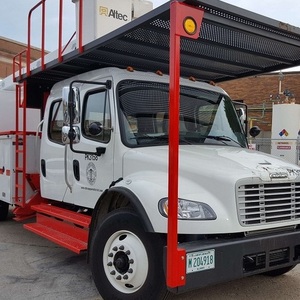Chicago Park District's biodiesel program to be showcased Sept. 8

Photo: Chicago Area Clean Cities
August 30, 2016
BY Chicago Area Clean Cities
The Chicago Park District will showcase its innovative, environmentally friendly biodiesel program at a Fleet Education Seminar hosted by the Chicago Area Clean Cities Coalition Sept. 8.
The Chicago Park District’s program, which uses old cooking oil from local restaurants and events like the Taste of Chicago, enables the Park District to annually consume 8,700 gallons of ASTM-certified biodiesel at up to a 50 percent biodiesel/diesel blend. The high-blend biodiesel fuel is used in 56 of the district’s diesel fleet, ranging from lawnmowers to garbage trucks and log loaders.
“We made the move to clean-burning biodiesel fuel a few years ago,” said Michael Dimitroff, manager of art initiatives, Department of Cultural and Natural Resources for the Chicago Park District, a member of Chicago Area Clean Cities. “It has been paying off from the start, helping us to reduce vehicle emissions and save fuel, as well as save thousands of dollars annually on the cost of fuel.”
The program is a public/private partnership with Darling International, Renewable Energy Group Inc. and the Chicago Park District. Texas-based Darling International collects and recycles used restaurant cooking oil and byproducts from the beef, pork, and poultry processing industries. Darling makes a yearly donation of feedstock to the Chicago Park District. The feedstock is converted to biodiesel by REG in its Danville, Illinois, facility and sent to the park district’s fueling site for fleet usage. The biodiesel meets BQ-9000 specifications, which is the highest quality biodiesel available.
Advertisement
In 2011, the Chicago Park District repurposed an underutilized fleet fueling site to enable biodiesel blending at the fuel pump. Indigenous Energy, based in Chicago, oversees the biodiesel program and operates the fueling site located at Lakeshore Drive and 39th Street.
Biodiesel is a renewable, biodegradable fuel manufactured domestically from vegetable oils, animal fats or recycled restaurant grease. According to the U.S. DOE, it is a cleaner-burning replacement for petroleum diesel fuel. Biodiesel meets both the biomass-based diesel and overall advanced biofuel requirement of the renewable fuel standard (RFS), a federal program that requires transportation fuel sold in the U.S. to contain a minimum volume of renewable fuels.
“Government fleets in Illinois are required to use at least 5 percent biodiesel, and all the park district’s diesel vehicles are complying with—or surpassing—that mandate,” said Pete Probst, director of research and development, Indigenous Energy. “We ensure a seamless integration of high blends of biodiesel by maintaining fuel integrity and closely monitoring the health of the fleet. The CPD stores the biodiesel in underground tanks and directly fuels their fleet from the blending dispenser and uses the CPD tanker truck to fuel vehicles at other locations throughout the city.”
Advertisement
The Chicago Park District has a fleet of more than 550 vehicles, including nearly 200 vehicles that use a 10 to 20 percent blend of biodiesel, 56 that use up to 50 percent biodiesel, 80 that use E85 fuel, more than 50 hybrid-electric vehicles, and 12 that use clean-burning compressed natural gas.
“The benefits of using renewable fuels and electric vehicles include reducing greenhouse-gas emissions, decreasing vehicle emissions, lowering demand for fossil fuels, increasing demand for domestic based fuels, which increases fuel security, and saving money,” Dimitroff said. “We’re also proud that the Chicago Park District has become a benchmark for other municipalities and fleets that want to go green with their fleets.”
Nearly 50 percent of biodiesel feedstock in the U.S. is derived from soybean oil, according to John DeRosa, director, environmental health for the American Lung Association in Illinois, who will highlight the environmental and health advantages of biodiesel at the seminar Sept. 8. In partnership with the Illinois Soybean Association, the ALAIL is a joint sponsor of the B20 Club of Illinois, a checkoff-funded program that recognizes and rewards Illinois-based fleets running on biodiesel blends of 20 percent.
The biodiesel workshop will be held Sept. 8 at the Maple Meadows Golf Course, 272 S. Addison Road, Wood Dale, 60191. Representatives from Clean Cities and the B20 Club will be available to demonstrate the benefits of using clean-burning, domestically produced biodiesel fuel. For more information, or to register, click here.
Related Stories
BDI-BioEnergy International has signed a contract with Ghent Renewables BV to begin the construction of a pioneering biofuel feedstock refinery plant. Construction is underway and the facility is expected to be operational by the end of 2025.
Gevo subsidiary announces agreement with Minnesota Soybean Processors to track and verify sustainable agriculture attributes
Verity Holdings LLC, a subsidiary of Gevo Inc., has partnered with Minnesota Soybean Processors (MnSP) to implement Verity’s proprietary track and trace software. The collaboration aims to unlock additional value through export premiums.
A small but increasing amount of biodiesel in the United States is consumed in the residential, commercial, and electric power sectors, according to new estimates now published in the U.S. EIA’s State Energy Data System.
IAG and Microsoft are extending their 2023 co-funded purchase agreement for SAF by five years. The SAF used under the agreement will be produced by Phillips 66’s Humberside refinery and LanzaJet’s facility in the U.S.
Neste and DB Schenker, a logistics service provider, have collaborated to work towards expanding DB Schenker’s adoption of Neste MY Renewable Diesel in Asia-Pacific. DB Schenker trialed the fuel from December 2024 to February 2025 in Singapore.
Upcoming Events










